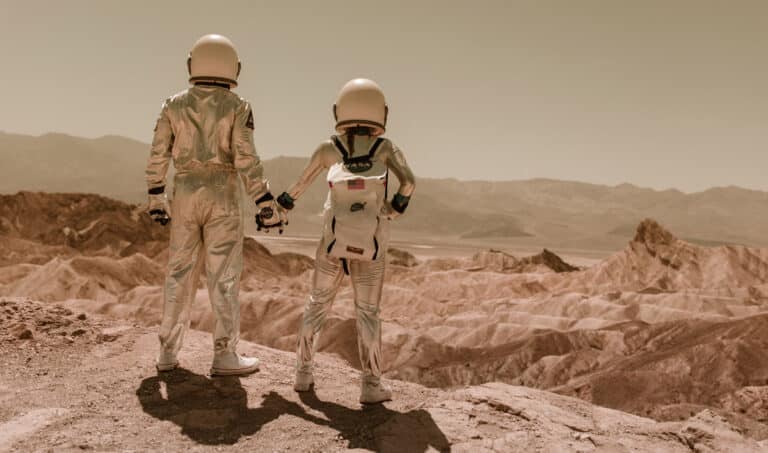Elon Musk believes there won’t be enough babies left to populate Mars soon
In 2016, SpaceX founder Elon Musk revealed his grand scheme of establishing a human settlement on Mars by the 2060s. “This is not about everyone moving to Mars, this is about becoming multiplanetary,” he said at the International Astronautical Congress held in Mexico at the time—adding how the colonisation could essentially “minimise existential risk” while having a “tremendous sense of adventure.”
Fast forwarding to January 2020, the ‘Technoking of Tesla’ updated his targets to put one million people on the red planet by 2050. Over the past few years, however, one of Musk’s biggest concerns is what his Mars mission aims to tackle: existential risk. In this case, premature existential risk triggered by population collapse. Simply put, what if there won’t be one million people available to inhabit Mars in the first place?
“Population collapse is a much bigger problem than people realise and that’s just for Earth,” the space billionaire tweeted last year—highlighting how Mars requires a great number of people to make colonisation possible since the population of the planet is obviously zero. “Humans are the custodians of other life on Earth. Let us bring life to Mars!” he urged.
Shortly after, Musk acknowledged how global fertility rates (the average number of children that would be born to a woman in her lifetime) are decreasing. To put it in his words: “Due to lack of banging, civilization might ended with a whimper! Adult diaper sales growth is much higher than baby diaper sales growth.”
Due to lack of banging, civilization might ended with a whimper! Adult diaper sales growth is much higher than baby diaper sales growth. https://t.co/eYk3nJNf6s
— Elon Musk (@elonmusk) July 14, 2021
Inching towards late 2021, among the climate of the disastrous overturn of Roe v. Wade in Texas, the Technoking failed to read the room again by stating “I think one of the biggest risks to civilization is the low birthrate and the rapidly declining birthrate. And yet, so many people—including smart people—think that there are too many people in the world and think that the population is growing out of control.” At the Wall Street Journal’s CEO Council summit, he also added: “Please look at the numbers, if people don’t have more children, civilization is going to crumble. Mark my words.”
So, is ‘women having more babies’ truly the ultimate solution for the concerns raised by Musk? “One thing it’s really important to realise is that population is actually irrelevant to solving the climate crisis,” sustainability scientist Kimberly Nicholas said in an interview with Vox. “And the reason for that is that we only have the next few years to solve the climate crisis reasonably well.” That being said, however, climate anxieties are definitely influencing people’s decisions of having children in the era of climate change. And have been for decades.
In 2019, the United Nations (UN) projected that the world’s population is expected to increase by 2 billion people in the next 30 years—from 7.7 billion to 9.7 billion in 2050. According to the organisation’s World Population Prospects, the global population could skyrocket close to the end of the current century, at a level of nearly 11 billion. The UN also added how growth rates vary greatly across regions despite the world’s population continuing to increase.
“The new population projections indicate that nine countries will make up more than half the projected growth of the global population between now and 2050: India, Nigeria, Pakistan, the Democratic Republic of the Congo, Ethiopia, the United Republic of Tanzania, Indonesia, Egypt and the United States of America (in descending order of the expected increase),” the report read. “Around 2027, India is projected to overtake China as the world’s most populous country.”
In the latest series of tweets, however, Musk claimed that “UN projections are utter nonsense.” As proof, he urged his followers to multiply last year’s births by life expectancy. “Given [the] downward trend in birth rate, that is best case unless reversed,” he added. The thread also continued with him stating “If there aren’t enough people for Earth, then there definitely won’t be enough for Mars 😕”
We should be much more worried about population collapse
— Elon Musk (@elonmusk) January 18, 2022
Father of seven, Musk isn’t exactly a hypocrite—we’ll give him that. In fact, the space billionaire believes he’s “trying to set a good example” in saving Earth from its population doom caused by the “lack of banging.” Nevertheless, Musk believes his dream of building Muskville and humanity eventually becoming multiplanetary seems to be drifting out of reach. Until then, the Technoking advises to bang or be ready for Earth to end with a bang. Sorry, “whimper.”
Population collapse could be upon us, but we appreciate that you good sir are still making tangible efforts to stave it off. @elonmusk 👶🏻💚🌎 pic.twitter.com/qlwz1JBUhj
— Tesla East Bay Fremont (@TeslaOwnersEBay) July 14, 2021





